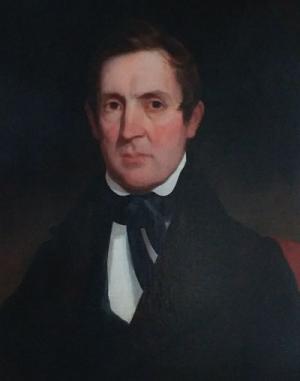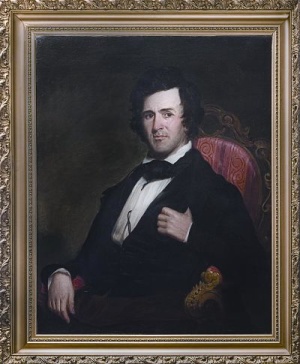Mason Brown (b. 1799- d. 1867)
Mason Brown was born in Philadelphia in 1799 but grew up in Frankfort at Liberty Hall. He was the eldest child of John and Margaretta. Like his father he became a lawyer and helped shape Kentucky into the commonwealth it is today.
As a child, Mason was educated at home by his parents and later private tutors. He attended Yale University and graduated in 1820 before completing his study of the law at Transylvania University in Lexington. A few years later he was practicing law in Maysville.[1]

In 1825 Mason married Judith Ann Bledsoe and they welcomed their first and only child Bengamin Gratz Brown in 1826. A year later, Judith fell sick with an illness described as water in the lungs. After a long battle with the illness, possibly pneumonia, she died on August 28, 1827. Grief-stricken, Mason left his son in the care of his mother, Margaretta.[2] Eight years after Judith’s death, Mason remarried in 1835 to Mary Yoder.[3]
Mason and Mary moved into Liberty Hall after their marriage, and John and Margaretta passed on the responsibilities of the house to the new couple. In April of 1837 John Mason, their first child, was born, but in August tragedy would strike again with the death of Mason’s father, John. Their family would continue to grow when Margaretta Mason, Mary Yoder, Yoder, and twins, Knox and Eliza were born.
Two years after the death of his father, Mason was appointed to be a Circuit Court Judge and held the position for ten years.[4] While serving, he was also the chairman of the new Frankfort Cemetery Company, which in 1845 re-interred Daniel Boone’s remains in Frankfort.[5] When Mason retired from the Circuit Bench, he began his own law practice, and may have used the Liberty Hall attic as his office.
Mason and his friend, Charles Morehead, wrote A Digest of the Statute Laws of Kentucky in 1834. One of the first comprehensive studies of Kentucky law, their book made the law accessible to lawyer across the state even in the most far flung places. In 1855, Morehead would be elected Governor and appointed Mason to be his Secretary of State.[6]
Just before the start of the Civil War, a committee formed in Frankfort to support the Union effort in Kentucky and Mason was one of the members. He was vocally pro-Union and delivered a “spirited address” to the group on March 30th.[7] Despite his support for the Union, Mason would continue to enslave people until the passage of the 13th Amendment.
In 1867 Mason died and was buried in the Frankfort Cemetery.
Orlando Brown (b. 1801- d. 1867)
John and Margaretta’s second son, Orlando, was born in Frankfort in 1801 and also grew up at Liberty Hall. Like all the Browns, was influential in the community although not as a lawyer but as a writer.
Orlando was first educated at home by Margaretta, and later by private tutors. In 1818, he was sent to Danville, Kentucky to study under Kean O’Hara where he studied geography, algebra, and six books of Euclid in preparation for college.[8] That same year he began his studies at Princeton and graduated in 1820. Unlike Mason, when Orlando graduated from college he did not know what his career would be.

For a couple years Orlando studied medicine under his uncle Dr. Preston Brown but switched to law and in 1823 he graduated from Transylvania University with a Law degree.[9] Around the same time, Orlando confessed his love for his first cousin, Mary Watts Brown, who told him that “she did not and could not love him.”[10] Shortly after the rejection he moved to Tuscumbia, Alabama to practice law until his partner died in 1828. A year later he returned to Frankfort.
Despite her prior refusal Orlando and Mary were married in 1830.[11] The next year they welcomed their first child, Euphemia. They would have four children, but only three would live to adulthood: Euphemia, Mason Preston, and Orlando Jr. John Preston their second child was born in 1834, but died in infancy.
In 1833, Orlando finally settled on a career. He and A.G. Hodges co-founded the Frankfort Commonwealth and served as the editor for nine years. The paper had a bias towards the Whig Party, of which Orlando was a member, but supported the freedom of the press and information wanting the paper to be a service to the community.[12]
John split his property between his two sons in 1835. Mason inherited Liberty Hall, while a new home was constructed for Orlando designed by Gideon Shryock. The same year Orlando was on the Board of Internal Improvements and helped improve navigation on the Kentucky River. He continued to serve the community in 1836 as the First Corresponding Secretary of the Kentucky Historical Society.
Tragedy would strike for Orlando in 1840 when Mary gave birth to a stillborn son. For a year after, she would suffer from an unknown illness before she passed away. Orlando would mourn her for a decade before getting married again in 1852 to a woman named Mary Cordelia Broadhead.
Orlando continued writing at The Commonwealth until he began a career in politics in 1848 when he was appointed to be the Secretary of State under Governor Crittenden. He would only hold this position for a short time because in 1849 President Zachary Taylor appointed him to be the Commissioner of Indian Affairs. In that role he supported assimilation and manual labor schools for indigenous people. Orlando resigned from the Bureau of Indian Affairs in 1850.[13] He returned to writing in the 1860s as the editor of the Commonwealth and the author of a history of Kentucky Governors which he would never finish. In 1867 Orlando passed away and was buried in the Frankfort Cemetery.
References
[1] Obituary Record of Graduates of Yale College. 1866, 237; H. Levin and George Du Relle. Lawyers and Lawmakers of Kentucky. Chicago: The Lewis publishing company, 1897, 208
[2] Margaretta Brown to Orlando Brown. June 18, 1827. Liberty Hall Collections.
[3] Obituary Record of Graduates of Yale College. 1866, 237.
[4] H. Levin and George Du Relle. Lawyers and Lawmakers of Kentucky. Chicago: The Lewis publishing company, 1897, 208
[5] Meridith Mason Brown. Frontiersman: Daniel Boone and the Making of America. 2008.
[6] Obituary Record of Graduates of Yale College. 1866, 237; H. Levin and George Du Relle. Lawyers and Lawmakers of Kentucky. Chicago: The Lewis publishing company, 1897, 208
[7] The Daily Commonwealth, April 1, 1861.
[8] John Brown to Samuel Brown. June 10, 1818. Liberty Hall Collections
[9] The Register of the Kentucky Historical Society, Vol. 49, Jan. 1951, No. 166
[10] John Brown to Samuel Brown. August 28, 1824. Liberty Hall Collections.
[11] Margaretta Brown to Ebenezer Mason. August 5, 1830. Liberty Hall Collections.
[12] Charles Deusner, Orlando Brown: Whig Editor of Kentucky, (Kentucky: University of Kentucky, 1962)
[13] David DeJong, Paternalism to Partnership, (Nebraska: Board of Regents of the University of Nebraska, 2021), 76- 79. https://lccn.loc.gov/2021758452
